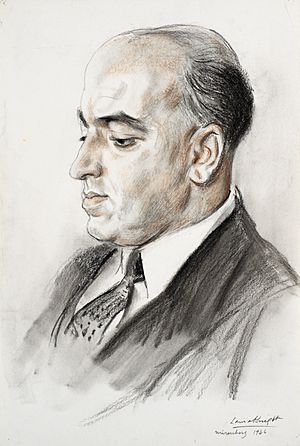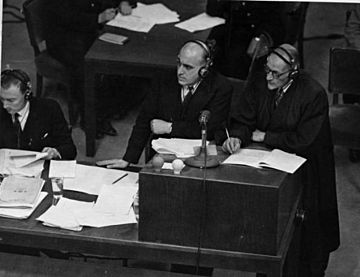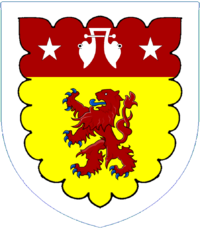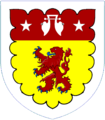David Maxwell Fyfe, 1st Earl of Kilmuir facts for kids
Quick facts for kids
The Earl of Kilmuir
|
|
|---|---|

Nuremberg sketch by Laura Knight (1946)
|
|
| Lord High Chancellor of Great Britain | |
| In office 18 October 1954 – 13 July 1962 |
|
| Prime Minister | |
| Preceded by | The Lord Simonds |
| Succeeded by | The Lord Dilhorne |
| Home Secretary | |
| In office 27 October 1951 – 19 October 1954 |
|
| Prime Minister | Winston Churchill |
| Preceded by | James Chuter Ede |
| Succeeded by | Gwilym Lloyd George |
| Attorney-General for England | |
| In office 25 May 1945 – 26 July 1945 |
|
| Prime Minister | Winston Churchill |
| Preceded by | Sir Donald Somervell |
| Succeeded by | Sir Hartley Shawcross |
| Solicitor-General for England | |
| In office 4 March 1942 – 25 May 1945 |
|
| Prime Minister | Winston Churchill |
| Preceded by | Sir William Jowitt |
| Succeeded by | Sir Walter Monckton |
| Personal details | |
| Born | 29 May 1900 Edinburgh, Scotland, UK |
| Died | January 27, 1967 (aged 66) Withyham, Sussex, England, UK |
| Nationality | British |
| Political party | Conservative |
| Spouse | Sylvia Harrison (m. 1925) |
| Children | 3 |
| Alma mater | Balliol College, Oxford |
David Patrick Maxwell Fyfe, 1st Earl of Kilmuir (born 29 May 1900 – died 27 January 1967) was an important British politician, lawyer, and judge. He was a member of the Conservative Party.
He held many high-ranking jobs in the government. These included Solicitor General, Attorney General, Home Secretary, and Lord High Chancellor of Great Britain.
Maxwell Fyfe was also a key prosecutor at the famous Nuremberg Trials after World War II. He helped to bring justice to the leaders of the Nazi regime. Later, he played a big part in writing the European Convention on Human Rights. This important document protects people's basic rights across Europe.
Contents
Early Life and Education
David Maxwell Fyfe was born in Edinburgh, Scotland, in 1900. He was the only son of William Thomson Fyfe, a headmaster.
He went to school at George Watson's College and then studied at Balliol College, Oxford. During World War I, he served in the Scots Guards in 1918–1919.
After university, he worked for a political group. At the same time, he studied law. He became a lawyer in 1922. He started his legal career in Liverpool.
Starting a Political Career
Maxwell Fyfe began his political journey by running for Parliament in 1924. He tried for the Wigan area, but it was a difficult seat to win.
He later focused on the Spen Valley area. In 1935, he was elected to Parliament for Liverpool West Derby.
His legal career also grew. In 1934, he became a King's Counsel, which is a very senior lawyer. He also served as a judge (called a Recorder) in Oldham from 1936 to 1942.
Joining the Government and the Nuremberg Trials
When World War II started in 1939, Maxwell Fyfe joined the army. He worked in the department that deals with military law. He was injured in an air raid in 1940.
In 1942, Winston Churchill appointed Maxwell Fyfe as Solicitor-General. At this time, he was also made a knight and became a member of the Privy Council.
He worked hard in the wartime government. He started planning how the leaders of the Nazi regime would be held responsible after the war. When the war ended in Europe in May 1945, he briefly became Attorney-General.
The Labour Party won the 1945 election. Sir Hartley Shawcross became Attorney General and the main British prosecutor for the Nuremberg Trials. Shawcross asked Maxwell Fyfe to be his deputy.
Maxwell Fyfe took on most of the daily work at the trials. He was known as a skilled lawyer and a good organizer. His questioning of Hermann Göring, a high-ranking Nazi, was very famous.
After the War: In Opposition
After the Nuremberg Trials, Maxwell Fyfe returned to Parliament. He continued his busy legal career while also working as a Member of Parliament. He was known for his incredible work ethic.
He helped write the Conservative Party's Industrial Charter in 1947. This document outlined the party's plans for industry. He also led a committee that looked at how the Conservative Party was organized. This led to the Maxwell Fyfe Report (1948–49). The report changed how election campaigns were funded. It aimed to help more different kinds of people become Members of Parliament.
Maxwell Fyfe strongly supported European integration. He was part of the Council of Europe from 1949 to 1952. He helped write the European Convention on Human Rights. This important agreement protects human rights and freedoms in Europe.
Back in Government
Home Secretary
In 1951, the Conservative Party won the election. Churchill appointed Maxwell Fyfe as Home Secretary. This job involves looking after law and order in the country. He also became the cabinet minister for Welsh affairs.
He helped pass important laws, including those that set up commercial television. He was known as a hard-working and reliable member of the government.
In 1952, the head of MI5 (Britain's security service) became directly responsible to the Home Secretary. Maxwell Fyfe issued the Maxwell Fyfe Directive. This document set out how the Security Service should operate. It was like their rulebook until a new law was made in 1989.
During his time as Home Secretary, he faced a lot of debate about the hanging of Derek Bentley. Maxwell Fyfe decided not to stop the execution, even though many people asked him to. However, on most issues, he was a more modern thinker in the Conservative Party. For example, he was against bringing back corporal punishment in 1953.
Lord Chancellor
Maxwell Fyfe wanted to become Lord Chancellor. This is a very old and important legal role in the UK. In 1954, he was given the title Viscount Kilmuir. He then moved to the House of Lords.
As Lord Chancellor, he was involved in many government issues. He worked on the constitution of Malta and helped create the Restrictive Practices Court. He did not often sit as a judge during his eight years in this role.
Lord Kilmuir was against a bill in 1956 that aimed to end capital punishment (the death penalty). He believed it would be dangerous for the country. However, he later led a committee that suggested limiting the death penalty. This led to the Homicide Act 1957.
He continued as Lord Chancellor under Prime Ministers Anthony Eden and Harold Macmillan. In 1962, Macmillan made big changes to his government. Lord Kilmuir was replaced. To soften the news, he was given the higher title of Earl of Kilmuir.
After Government
After leaving government, Lord Kilmuir joined the board of a company called Plessey. However, his health soon got worse.
He passed away in Withyham, Sussex, on 27 January 1967. His ashes were buried at a church there. Since he only had daughters, his titles ended when he died.
Family and Personality
David Maxwell Fyfe married Sylvia Harrison in 1925. They had three daughters. His brother-in-law was the famous actor Sir Rex Harrison.
Lord Kilmuir was a strong presence in Parliament. He had an amazing memory. People described him as having a "pear-shaped" body and a "large square bald head."
When he was Home Secretary, he often visited Wales. In the valleys of South Wales, people nicknamed him Dai Bananas. This was because Fyffes was a major fruit importer in Britain at the time.
Honours and Awards
David Maxwell Fyfe received many honours throughout his life:
- King's Counsel (KC) (1934)
- Knighthood (Kt) (1942)
- Privy Councillor (PC) (1945)
- Viscount Kilmuir (1954)
- Earl of Kilmuir (1962)
- Knight Grand Cross in the Royal Victorian Order (GCVO) (1953)
He also received honorary degrees from several universities, including:
- University of Oxford
- University of Manitoba (1954)
- University of Edinburgh (1955)
- University of Wales
- University of Ottawa (1960)
He was also a Visitor of St Antony's College, Oxford (1953) and Rector of the University of St Andrews (1956).
|
Portrayals in Film and TV
David Maxwell Fyfe has been played by actors in several films and TV shows:
- Iain Cuthbertson in the 1991 film Let Him Have It
- Christopher Plummer in the 2000 TV production Nuremberg
- Julian Wadham in the 2006 TV docudrama Nuremberg: Nazis on Trial
- Mel Smith in the 2007 TV drama Consenting Adults
- John Warnaby in the stage play Plague Over England (2009)
- Zdzisław Mrożewski in the Polish film Epilog norymberski
- His grandson, Tom Blackmore, is also making a film about him called Under an English Heaven.
Images for kids
 | Ernest Everett Just |
 | Mary Jackson |
 | Emmett Chappelle |
 | Marie Maynard Daly |






